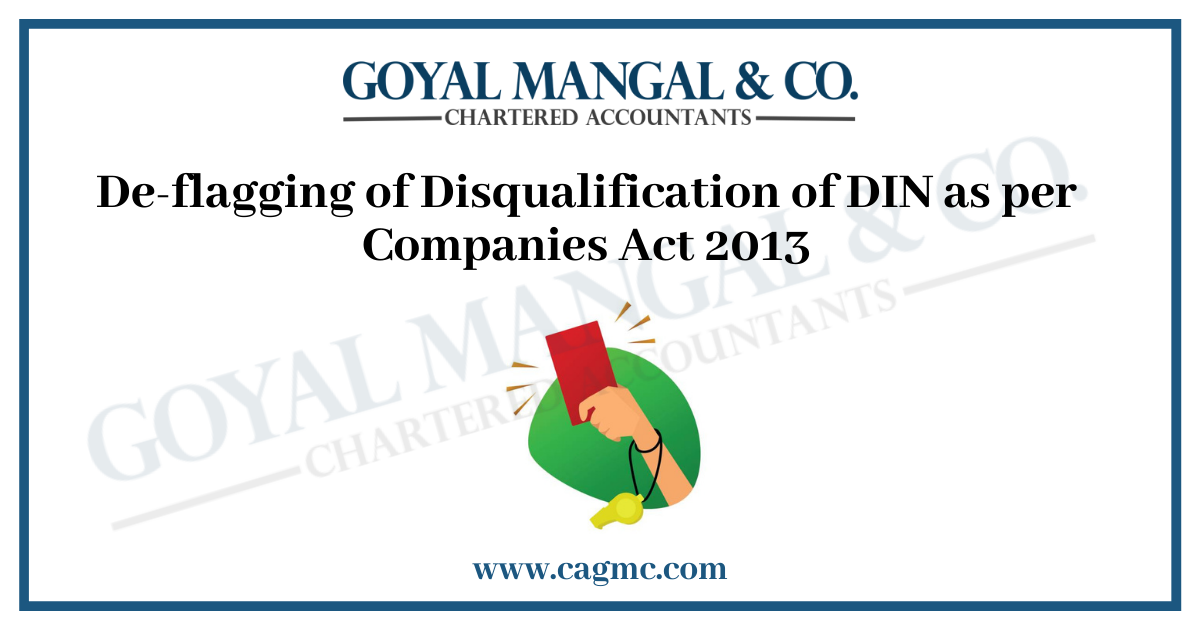
A firm is a separate legal entity that does not have its own physical existence and so only operates through natural individuals. Directors are a group of professionals recruited by a firm to help it optimize its operations. Directors are held to a fiduciary standard when it comes to the company’s operations. The Companies Act of 2013 recognizes the Director’s responsibilities by holding them liable in the event of any failings from the Director’s end. Moreover, Directors may be disqualified in two situations under Section 164 of the act. Now, let’s move forward in this blog to know more about the De-flagging of disqualification of DIN.
What are DIN and Disqualification of Directors?
The Director Identification Number (DIN) is a number hand-out by the Central Government to individuals who want to become or are already directors of a firm. A DIN is necessary for all company directors. Section 164(2) of the Companies Act, 2013 allows the Registrar of Companies (ROCs) to reject a director’s DIN.
Furthermore, in a way, disqualification of directors prevents someone from becoming and acting as a director. Furthermore, being disqualified as a company director implies that he or she is unable to nominate as a director of any company within the time frame set out in the Act or any applicable rules and regulations.
What are the reasons for the rise of Disqualification?
Section 164(2) of the Companies Act, 2013 has a broad scope. Also, a Director is incompetent even if the firm in which he serves as a Director commits a default. The disqualification is the result of three years of failure to file yearly returns and financial statements.
The problem arose in 2017 when various Registrars (ROCs) post a list of defaulting companies and directors who were disqualified. The ROCs evaluated corporations that had defaulted in filing annual reports and financial statements.
Elimination of directors under Section 164 (2) of Companies Act, 2013
According to Section 164(2), a director is ineligible for re-appointment as a director of a business. Also, accordingly to appoint as a director of another company for five years after the company of the director fails to comply with the following:
- Has not submitted financial statements or Annual Returns for three consecutive financial years; or
- Failed to refund deposits accepted by it or pay interest thereon, or to redeem any debentures on the due date.
- Failed to pay interest due thereon, or to pay any dividend announced for one year or longer.
What are the consequences of a director’s disqualification?
- The DINs of all the directors marked as inactive by the ROCs in 2017 due to disqualification under Section 164(2)
- These are not permit for serving as directors in any other company for the next five years.
- According to the Act, a director who is disqualified under Section 164(2) of the Act can re-appointed as a director of a business once the MCA de-flags the disqualification of DIN.
- After five years from the date of disqualification, the MCA will de-flag the disqualified DIN.
De-flagging of Disqualified directors
The Ministry of Corporate Affairs (“MCA”) has issued a “Public Notice” stating that the DIN of all directors who have been flagged as inactive due to disqualification under Section 164(2) of the Companies Act, 2013 for a period of 5 (five) years will be eligible to be de-flagged once the disqualification period has expired or been completed.
As a result, the directors’ DIN said that the various ROCs disqualified in 2017 were entitled to the lifting of the disqualification order in October 2021, i.e. five years after the disqualification order was issued.
The MCA is in the process of de-flagging the disqualified DIN, and such directors’ DINs will shortly change from ‘Disqualification’ to ‘Active.’ Meanwhile, all disqualified directors must complete Form DIR-3 KYC. It is to ensure that their re-appointment as directors is not inhibiting.
Remedies and Reliefs for disqualification
- In the event of disqualification, a director can file an appeal with the National Business Law Appellate Tribunal (NCLAT) to have his or her position in the company reinstated. A stay order might also request by the plaintiff.
- According to the Company Act of 2013, the Disqualification order will only take effect 30 days after issuing. After filing an appeal, the applicant is eligible to serve as Director for the next seven days.
- During this time, he has the right to file annual returns in order to keep the disqualification order in place. As a result, there is no such thing as reappointment for such a person. Reappointment will only consider when a five-year period of disqualification had passed.
Conclusion
By analyzing the above blog we can conclude that the MCA’s decision to remove the DIN disqualification will undoubtedly come as a huge relief to Directors who have been unable to carry out their duties since January 10, 2016. Also, all defaulting officials are now free to resume their duties. Moreover, they can apply for new assignments with other registered businesses.







